#voter sentiment
Text
"Political Pundits Predict: Lok Sabha Elections 2024 in India Set to Shake NDA's Majority"
As the anticipation builds for the upcoming Lok Sabha Elections in 2024, political analysts and pundits are scrutinizing every indicator, from public sentiment to the betting trends in places like Phalodi Satta Bazar. While the outcome remains uncertain, one prevailing sentiment emerges: the National Democratic Alliance (NDA) might face challenges in securing a resounding victory.
Contrary to…
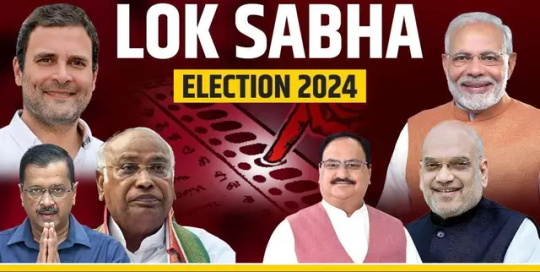
View On WordPress
#betting trends#coalition politics#coalition-building#electoral dynamics#electoral speculation#Indian democracy#Indian politics#Lok Sabha Elections#Lok Sabha Elections 2024#NDA#NDA majority#opposition alliances#Phalodi Satta Bazar#political analysis#political dynamics#political speculation#regional parties#voter preferences#voter sentiment
0 notes
Text
Shocking Revelation: 1 in 4 Voters Obsess Over Immigration!
A recent Ipsos Mori poll has highlighted a growing concern among the public regarding immigration, with one in four voters considering it to be among the top four most pressing issues. This places immigration on par with high inflation, the state of the economy, and the state of the National Health Service (NHS) in the minds of many voters.
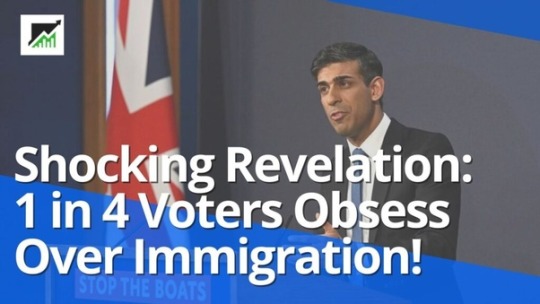
For more visit: financeprozone.com -
#Demographic Trends#Election Insights#Election Topics#Electoral Trends#Immigration Debate#Immigration Issues#Immigration Policy#Immigration Statistics#Policy Impact#Political Discourse#Political Perspectives#Political Priorities#Public Debate#Public Opinion#Social Issues#Voter Behavior#Voter Concerns#Voter Preferences#Voter Sentiment
0 notes
Text
Like, okay, I OBVIOUSLY have no authority over the fandom, not even this small corner of it and the authoritative tone of my Archmage of Congeniality post is just the kayfabe, but I very much am so big uwu heart emojis over all the veth campaigning and I do sincerely hope that we all recognize how fun and delightful this has been and remember to be whimsical and silly and dedicated to the things we love about fandom and that my feelings about how sincerely fun it has been to watch everyone helps bring that forward
#I am actually kinda ;-; about it okay. it's been a week / month#the quarterfinal round was like bizarrely vicious and bitter and angry and the Veth campaigning here in the semis has been genuinely a joy#and I think that contrast and dichotomy has highlighted a lot in fandom#It's been so <3 to participate in a round that was focused on the wild stuff you can say about Why You Should Support Veth#and it felt SO uplifting after the conversations I was having about just... the anger and bitterness motivating many voters in other polls#anyway. forgive a bitch her sentimental moments#Critical Role things#CR
54 notes
·
View notes
Text
im not over how the posts i rb criticizing the us/biden (mostly from palestinians) was considered anti voter rhetoric and i was blocked by someone i thought was a friend for it
#im just pissed off#mostly by how it concerns me thats how they viewed the voices of palestinian folk#when someone pretends to care about this country’s politics but doesn’t actually give a shit if thats ur reaction to its criticism#all we say is that biden is committing genocide. and that’s anti voter sentiment to you??? seriously go fuck yourself#txt
6 notes
·
View notes
Text

Do you think traditional voters are having the same sentiment?
#Do you think traditional voters are having the same sentiment?#electoral college#electoralism#electoral bonds#electoral politics#electoral commission#voters#voter id#voter fraud#voter registration#voter#voting is a scam#voting is not harm reduction#democracy#democracy is a lie#democracy is sold out#capitalism#fascism#anti imperialism#american imperialism#us imperialism#fuck imperialism#ausgov#politas#auspol#tasgov#taspol#australia#fuck neoliberals#neoliberal capitalism
4 notes
·
View notes
Text
.
#I guess I shouldn't shoot off about these things when I never studied political science in-depth#But I find it oddly impressive that nobody's (yet) come out and said#That they consider Trump the... not lesser but more preferable of two evils#*Because* he'll fuck up the USA on top of all the other countries#Which has its own appeal for those who think America is already too far gone (was *born* too far gone) and the only justice is its death#This was - for better or worse - the lesson most people take from World War II#(Not exclusively liberal or conservative *or* Western)#That a country with a long enough rap sheet can't be internally reformed - only burned to the ground and rebuilt externally#(There was a limited version of the sentiment floating around at the start of Covid I think)#(Where people called the body count and Trump's bungling response to it America/capitalism's just deserts)#(I guess they cut that out right quick)#... anyway I'm not too sure why I started writing this#Maybe because I find it headscratchy that every anti-Trump post on here talks about his malice and his incompetence in the same breath#When these two things have basically opposite pulls on the far-leftists that are (supposedly) so crucial to Biden winning#'What is good for the Democratic Party is good for America' is already a shaky sell to people who aren't lifelong Blue voters#'What is good for America is good for the world' - you try that one at your own peril
4 notes
·
View notes
Text
YCP: గుంటూరు పశ్చిమలో వైసీపీ గెలుపును ఆపలేరు.. విడదల రజనీ వైపే ప్రజలు!!
#Vidadalarajini #YCP
YCP: గుంటూరు పశ్చిమలో మౌలిక సౌకర్యాల కల్పనపై వైసీపీ అభ్యర్థి విడదల రజనీ దృష్టి సారించారు. ముఖ్యంగా డ్రైనేజీ, తాగునీరు, ఎక్కడపడితే అక్కడ అడ్డదిడ్డంగా కలిసిపోయిన కరెంటు తీగల సమస్యను పరిష్కరిస్తామని అందరికీ చెబుతున్నారు. దీంతో ప్రజల్లో ఒక చైతన్యం వస్తోంది. దశాబ్దాల తరబడి స్థానికంగా ఉన్న సమస్యలపై 2014 ,2019 లో రెండుసార్లు పదేళ్లు అధికారంలో ఉన్న తెలుగుదేశం ఎమ్మెల్యేల వల్లా కాలేదు. అంతకుముందు 2009లో…
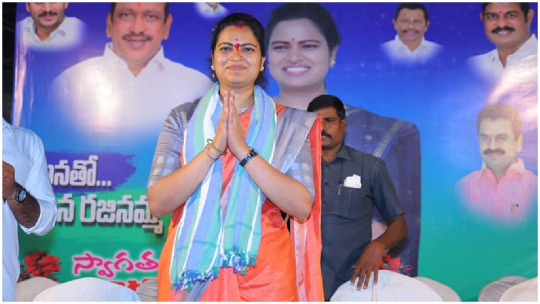
View On WordPress
#Guntur Paschima constituency updates#Guntur Paschima elections#Guntur West Assembly constituency analysis#Rajini&039;s campaign strategy in Guntur Paschima#Vidadala Rajini political background#Voter preferences in Guntur West#Voter sentiment towards Vidadala Rajini#YCP Vidadala Rajini#YSR Congress Party (YCP) in Guntur#YSRCP Guntur Paschima candidate
0 notes
Text
South Korea’s Political Tide Turns: Liberal Opposition Clinches Decisive Victory in Parliamentary Elections
In a significant shift in South Korea’s political landscape, the liberal opposition parties triumphed in the recent parliamentary elections, delivering a stark message to President Yoon Suk Yeol and his conservative party. Despite not securing a supermajority, the Democratic Party (DP) is set to dominate over half of the 300 parliamentary seats, with allied liberal factions adding to their…
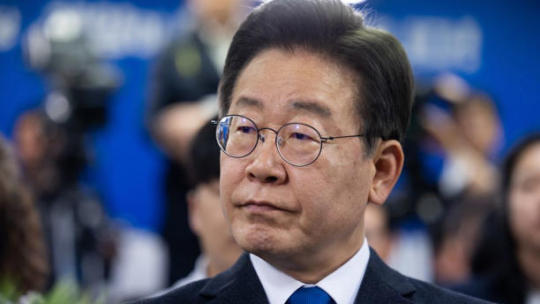
View On WordPress
#AI News#data analysis#misinformation detection#News#post-election analysis#prediction#sentiment analysis#south korea#voter engagement
0 notes
Text
#this is what the progressives had failed to respect and appreciate in 2016#primary election is a much more manipulative popularity contest than a general election#primary election is a momentum contest and by nature a great deal of party faction coercion takes place#primary elections were never the same as general election that a single day outcome would seal the fate#Bernie sanders had to prove his worth through voters and caucuses and party shifting interest#and in 2016 the entire democratic primary election was undermined by facebook and Cambridge analytica into an unlawful manipulation of the#public opinion with headquarter email server hacking and subversive social media user fakenews psyop#people completely failed to recognize the crime committed in hacking dnc and then letting facebook distort their sentiments#taiwantalk
1 note
·
View note
Text
I just want to say, after seeing some of it come across my dash again, because after all, people reblog and reblog and reblog...
I feel that guilt-tripping readers is ineffective at best and gets them hostile at worst. I know that this is the time that we all scream into the void at the encroaching dark and holy shit the world's messed up and in the Information Age we all get to know a lot more than our ancestors did, but with apologies to the mutual I saw reblogging things he cares about (and I reblog the same subject matter from them and others), just... the way one post was worded just got me thinking on a long philosophical track.
Some of us are doing what we can in light of the situation, which is not much, because we are not in power. All we have is our personal vote / no vote / I trusted you and you let me down lists in our heads. Some of us have written congresscritters whom we know aren't listening. Some who can give money and are sure they are giving to organisations that won't be intercepted and the money gobbled up have been giving. Some are afraid that's going to happen and are living paycheck to paycheck so all we have is our griping. (And some of us have disabilities physical, psychiatric and transportational that keep us from attending protests). So some of us might be doing what we can, but it's not enough and can't be.
Anyway, the philosophical train of thought that my brain got onto:
I don't think it actually does much to tell people "What you're doing now is what you would have done during the Holocaust!" or "What you're doing now is what you'd be doing during slavery!" - this is used as a guilt trip, or perhaps a mirror to hold up to people who like to pretend that they are more heroic than they are.
What about those of us who do not think we are particularly good?
A friend of mine and I got to talking once about old books and how some people want to cancel or censor old literature, or who will look at you funny if you say you enjoyed old lit. The "Little House on the Prairie" books got brought up. I used to read those as a kid. I think I got up to the 4th or 5th book? And the last time I was reading them was when I was 8-9? My friend read them more recently and was talking about how one of the characters / protagonist's mother said "The only good Indian is a dead Indian," which is horrible, but honestly was a common sentiment among white settlers at the time and probably something that the author's mother had said. We agreed that censoring books isn't a good thing, instead, teaching children critical thinking skills and discernment is better. Kids ought to know the shit parts of history. My friend further went into the chilling conclusion that if we had lived in that time and place, we'd probably have the same sentiment, because a lot of your environment influences you.
I agreed that it was a likely scenario, but maybe not - as some people are ahead of their time and I have put away a lot of bigotries I was raised in / encountered early on and used to have as I have grown and met people and have had life experiences. (Ex-Evangelical). Also, the above "guilt trip type of tumblr / twitter post" made me think to something I said on a blog commentary pretty soon after tRump was elected about how I'd expected that if shit really hit the fan, that I might just keep my head down. We all like to think that we would go down fighting the establishment, every one of us a Katniss Everdeen with a bow in our hand or something, but the reality is, most people just keep their heads down and survive.
And I'm not a proud enough person to think that I am going to be doing anything else.
"If I was a German during the Holocaust" - depending upon how much I knew and my living/financial situation, well, yeah, I expect I'd be doing what I am doing now: Writing a lot of fiction short stories with symbolism indicting horrible leaders and political and cultural situations that said leaders are too stupid to get the symbolism of (hopefully) and sadly, hardly anybody reads.
Slavery days? Am I a Southerner or a Northerner? Most of my ancestry comes from Sweden, so I'd say I'd be there... but if American then... writing stuff with fantasy-ized slavery among varying castes of magical woodland animals or something in order to gentle the reader into seeing reality?
And otherwise just kind of keeping my head down, surviving, not materially being able to do much?
#politics#philosphy#I saw an excellent ad about american gun violence#using a drowning child as symbolsm#but it is directed at leaders although maybe at voters#although the posts coming across my dash are about the genocide in real time#that I see bits of every day on cnn#and I honestly don't think policies on that are going to change#until a certain generation withers away#and certain american religious sentiments also do#our foreign policy is messed up because of evangelical christian nationalists#and you can be christian without being one of them#if you're a progressive christian they hate you too trust me they hate me#and get to star in my snarky stories#it's about all I can do#cw: slurs#cw: anti-indigenous slur#cw: anti-indigenous slur from a very old biographical novel#cw: bigotry#cw: bigotry in old books
0 notes
Text
Economic Discontent Among Biden Voters Signals Potential Headwind for Reelection (globalpostheadline.com)
As President Biden contemplates a reelection bid, there's an unexpected hurdle emerging from within his own voter base – dissatisfaction with the state of the economy. Despite positive economic indicators, a New York Times/Siena College poll across six battleground states reveals that 62 percent of Biden voters perceive the economy as only "fair" or "poor." This sentiment among Democrats who supported Biden in 2020 could pose challenges in the upcoming election.
The Demographic Challenge
Biden's 2020 supporters, often younger, lower-income, and more racially diverse than Trump's base, appear to be feeling the impact of inflation and high interest rates. These economic factors disproportionately affect demographics that were crucial to Biden's victory.
Battleground State Insights
The poll breaks down sentiments across income, age, race/ethnicity, and gender categories, revealing varying degrees of economic dissatisfaction among Biden voters. While social issues remain a key concern, the economy's importance is not to be dismissed.
#Biden voter dissatisfaction#Economic discontent 2024 election#Reelection challenges for Biden#Voter sentiment and economy#Biden supporter concerns#Political headwinds in 2024#Economic issues and reelection#Impact on voter loyalty#Biden voter sentiments#2024 election challenges#USA election 2024#USA Election result projection#American Politics#USA News
0 notes
Text
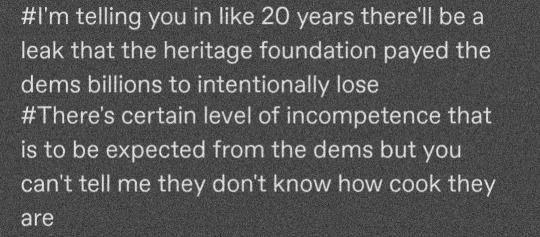
I see a bunch of posts like this and they all seem to assume there's a huge undercurrent of anti-Israeli sentiment in the general populace such that Biden would easily cruise to victory if he did the right thing, as opposed to the truth which is that the average voter sees Israel as a sort of Middle Eastern America under attack by strange foreigners and would take all but the most couched and careful opposition to Israel's actions as a betrayal.
3K notes
·
View notes
Text

really really cool and great that it only took four or five months, 30000 dead palestinians, countless war crimes and human rights violations - starmer was a human rights lawyer by the way - a provisional ruling at the ICJ, the suspension of several labour MPs and candidates for voicing pro-palestinian sentiments, the threat of rebellion within the PLP, and losing potential voters just before a general election for him to come to this conclusion! (source)
889 notes
·
View notes
Text
From a country where voting is not a choice, but a duty, it's interesting seeing American discourse every four years on whether or not voting matters. This year there's an added layer, because Joe Biden has been supporting Israel's genocide against Palestine. Now there's a pervading sentiment - both in and out of the US - that voting for Joe Biden supports Palestinian genocide, and it's an American's moral duty to withhold their vote in support of Palestine.
I guess the question I ask is: how is withholding your vote effective activism?
If you don't vote, and Trump wins, he says he will deport pro-Palestine demonstrators. He says he supports Israel's right to defend itself. If you vote independent, and Trump wins the same thing happens.
If Biden wins, he will continue his support of Israel.
So: Is voting really the battleground for the Palestinian genocide, when either outcome leads down the same road?
And what other battles are being fought in this presidential race?
Gun laws - Biden passed "the most significant gun safety legislation in more than two decades", the Bipartisan Safer Communities Act. It includes enhanced background checks for gun purchasers, and prohibits individuals convicted of domestic violence towards a romantic partner from purchasing a gun (wherein the past a 'boyfriend loophole' had existed, wherein the law only applied if an individual was convicted of domestic violence against a spouse or cohabitant). Trump has promised to overturn Biden's new laws.
Healthcare - Uninsured Americans are at an all-time low under Biden's administration, with only 7.6% of Americans being uninsured in the second quarter of 2023. The number of people who signed up to Obamacare in 2024 is at 21.3 million - and Trump plans to repeal it.
Climate change - Biden's Inflation Reduction Act invests 300 billion dollars towards clean energy. Electricity generation from renewable energy sources — including wind, solar and hydropower — surpassed coal-fired generation in the electric power sector for the first time in 2022, making it the second-biggest source behind natural gas generation. At a recent dinner with oil executives and lobbyists, the Republican promised to eliminate Mr Biden's new climate rules and environmental regulations if they donated $1bn to his campaign.
Much has been said about Trump's second term beyond the above three points. @batboyblog posted a very clear and concise graphic on Trump's plans for his second term.
The BBC has also posted about Trump's plans for his second term, which I'll screenshot:
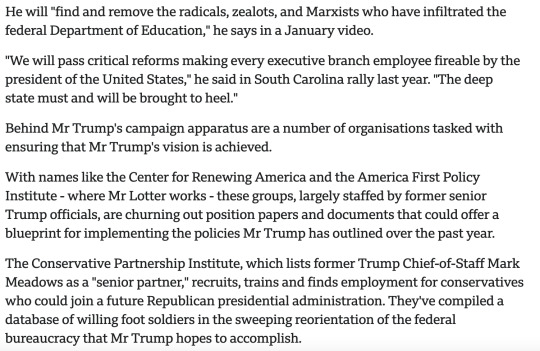
Trump is now a felon, but I was really shocked to learn about how little impact this has on his ability to run as president. His supporters are likely to stay by his side, because they believe in these policies.
Biden does not have the same luxury. I don't think he should have the same luxury. Still, I feel like it's important to point out that Trump and Biden's opinions on Israel and Palestine align, but there are a plethora of other issues they do not align on. As a voter, as an activist, when given two political parties, why would you choose based on the similarities as opposed to the differences?
Ways to help Gaza.
Vetted gofundmes.
Other links to help Palestine.
#uspol#politics#donald trump#joe biden#i wish americans had a preferential system#that meant an independent vote isnt the equivalent of throwing your hands in the air and giving up#.txt
329 notes
·
View notes
Text
Traditionally, the image of a figleaf was used by artists to cover the body parts (think Adam and Eve) that they were not supposed to show in their paintings. As I use the term, a figleaf is a communicative device that provides just a bit of cover for something that one isn’t supposed to show in public – like racism.
To see how this works, let’s first take a closer look at Trump’s call for a Muslim ban. Here is a statement, cast in the third person, that he read aloud in December 2015:
Donald J Trump is calling for a total and complete shutdown of Muslims entering the United States until our country’s representatives can figure out what the hell is going on.
The anti-Muslim message is loud and clear, and not hidden at all. But the end of the statement is the bit that I want to focus on: ‘until our country’s representatives can figure out what the hell is going on’. For some people, this phrase provided reassurance that Trump isn’t racist – because a real racist would want to ban Muslims period, not just while we figure out what’s going on. This is a figleaf: it provides just enough cover for the racism that isn’t acceptable to show in public.
One reason that figleaves like this work is that many white people accept what the sociolinguist Jane Hill called ‘the folk theory of racism’. This view sets a very high bar for what counts as racist: a racist has to consciously believe in the biological inferiority of people of colour, and intend to be racist. Somebody like this would want to ban Muslims forever, not just temporarily. Similarly, they wouldn’t suggest that ‘some’ Mexican immigrants are good people, as Trump did. Nor would they have a Black friend, or declare themself to be non-racist, this line of thinking goes.
A view such as this one makes it very easy for utterances to serve as figleaves for racism. These figleaves allow a voter to continue supporting a candidate who has made a comment that might have worried them. They don’t need to become fully convinced that the candidate is non-racist; it’s enough in many cases to be uncertain about whether the utterance indicates racism. When I examined discussions among Trump supporters online, I found people who worried about Trump’s views on Mexicans being reassured by those who pointed out that he also said some of them are good. ‘I didn’t hear him say anything racist against any race,’ one person posted. ‘What I did hear him say is, “Illegal Mexicans bring drugs, crime, and are rapists, but I’m sure some are good people.” Seriously, whats racist about that?’ Another Tweeted: ‘Trump is not racist … Trump is not against all mexicans just the illegals.’
Another classic form of figleaf involves reporting the words of others, either specifically (‘John Smith says…’) or in a vague, handwavy way (‘Lots of people are saying…’) This is a great way to avoid responsibility for what one is inserting into the discourse.
We see this technique in the British politician Enoch Powell’s infamous ‘Rivers of Blood’ speech in 1968, in which he described a constituent (a ‘quite ordinary working man’) as saying: ‘In this country in 15 or 20 years’ time the black man will have the whip hand over the white man.’ Reports like these help to normalise the sentiments expressed, while distancing the speaker from them.
Figleaves are not for everyone. Some people don’t need them: fully committed racists are happy with blatantly racist comments, no figleaves required. Many people won’t be convinced by them: antiracist activists, for example, will see right through the attempted reassurance. For others, though, they provide just what is needed – a licence to go on supporting the person they feel drawn to.
315 notes
·
View notes
Video
youtube
From Robber Barons to Bezos: Is History Repeating Itself?
Ultra-wealthy elites…Political corruption…Vast inequality…
These problems aren’t new — in the late 1800s they dominated the country during America’s first Gilded Age.
We overcame these abuses back then, and we can do it again.
Mark Twain coined the moniker “The Gilded Age” in his 1873 novel to describe the era in American history characterized by corruption and inequality that was masked by a thin layer of prosperity for a select few.
The end of the 19th century and start of the 20th marked a time of great invention — bustling railroads, telephones, motion pictures, electricity, automobiles — which changed American life forever.
But it was also an era of giant monopolies — oil, railroad, steel, finance — run by a small group of men who had grown rich beyond anything America had ever seen.
They were known as “robber barons” because they ran competitors out of business, exploited workers, charged customers exorbitant prices, and lived like royalty as a result.
Money consumed politics. Robber barons and their lackeys donated bundles of cash to any lawmaker willing to do bidding on their behalf. And when lobbying wasn’t enough, the powerful turned to bribery — resulting in some of the most infamous political scandals in American history.
The gap between the rich and poor in America reached astronomical levels. Large numbers of Americans lived in squalor.
Anti-immigrant sentiment raged, leading to the enactment of racist laws to restrict immigration. And voter suppression, largely aimed at Black men who had recently won the right to vote, was rampant.
The era was also marked by dangerous working conditions. Children often as young as 10, but sometimes younger, worked brutal hours in sweatshops. Workers trying to organize labor unions were attacked and killed.
It seemed as if American capitalism was out of control, and American democracy couldn’t do anything about it because it was bought and paid for by the rich.
But Americans were fed up, and they demanded reform. Many took to the streets in protest.
Investigative journalists, often called “muckrakers” then, helped amplify their cries by exposing what was occurring throughout the country.
And a new generation of political leaders rose to end the abuses.
Politicians like Teddy Roosevelt, who warned that, “a small class of enormously wealthy and economically powerful men, whose chief object is to hold and increase their power,” could destroy American democracy.
After becoming president in 1901, Roosevelt used the Sherman Antitrust Act to break up dozens of powerful corporations, including the giant Northern Securities Company which had come to dominate railroad transportation through a series of mergers.
Seeking to limit the vast fortunes that were creating a new American aristocracy, Congress enacted a progressive income tax through the 16th Amendment, as well as two wealth taxes.
The first wealth tax, in 1916, was the estate tax — a tax on the wealth someone accumulated during their lifetime, paid by the heirs who inherited it. The second tax on wealth, enacted in 1922, was a capital gains tax — a tax on the increased value of assets, paid when those assets were sold.
The reformers of the Gilded Age also stopped corporations from directly giving money to politicians or political candidates.
And then Teddy Roosevelt’s fifth cousin — you may have heard of him — continued the work through his New Deal programs — creating Social Security, unemployment insurance, a 40-hour workweek, and requiring that employers bargain in good faith with labor unions.
But following the death of FDR and the end of World War II, when America was building the largest middle class the world had ever seen — we seemed to forget about the abuses of the Gilded Age.
Now, more than a century later, America has entered a second Gilded Age.
It is also a time of extraordinary invention.
And a time when monopolies are taking over vast swathes of the economy, so we must renew antitrust enforcement to bust up powerful companies.
Now, another generation of robber barons is accumulating unprecedented money and power. So once again, we must tax these exorbitant fortunes.
Wealthy individuals and big corporations are once again paying off lawmakers, sending them billions to conduct their political campaigns, even giving luxurious gifts to Supreme Court justices. So we need to protect our democracy from Big Money, just as we did before.
Voter suppression runs rampant in the states as during the first Gilded Age, making it harder for people of color to participate in what’s left of our democracy. So it’s once again critical to defend and expand voting rights.
Working people are once again being exploited and abused, child labor is returning, unions are busted, the poor are again living in unhealthy conditions, homelessness is on the rise, and the gap between the ultra-rich and everyone else is nearly as large as in the first Gilded Age. So once again we need to protect the rights of workers to organize, invest in social safety nets, and revive guardrails to protect against the abuses of great wealth and power.
The question now is the same as it was at the start of the 20th century: Will we fight for an economy and a democracy that works for all rather than the few?
We’ve done it before. We can — and must — do it again.
621 notes
·
View notes